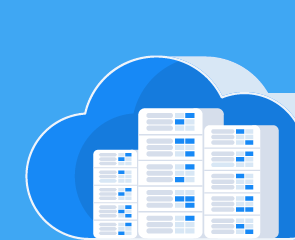Hybrid cloud solutions are becoming increasingly popular. In this blog post, we will explain what a hybrid cloud structure is, the different variations available, and the advantages it offers. Additionally, we will help you determine if transitioning from an on-premises infrastructure to a hybrid cloud infrastructure is worth considering.
First, let's start with the fundamentals: A hybrid cloud infrastructure can be designed in various ways. The following combinations are possible:
-
A combination of a private cloud and a public cloud
-
Multiple private clouds
-
Multiple public clouds
-
A virtual or physical (bare metal) environment that is connected to at least one cloud.
The various clouds are treated as completely separate platforms, each having their own applications and management systems.
Advantages of Hybrid Cloud Infrastructures
At Xelon, our goal is to provide IT service providers with an innovative hybrid cloud infrastructure platform that simplifies application management and creates more time for value-added activities. We firmly believe that hybrid clouds can enhance efficiency and promote innovation within businesses. Many companies opt for a hybrid cloud infrastructure for the following reasons:
- Reducing risks: By distributing data across multiple storage locations, sensitive information can be better protected from unauthorized access.
- Reduce overall costs of IT infrastructure and cloud services.
- Consolidating data centers
- Efficiently managing seasonal spikes in demand
Why should you consider a Hybrid Cloud Solution?
Transitioning to a hybrid cloud infrastructure is a decision that requires careful consideration. Is this cloud model suitable for your business? Here, we present an overview of its key benefits.
Flexibility and Scalability: The hybrid cloud approach empowers you to seamlessly shift workloads based on demand and efficiently utilize resources. During peak periods, businesses can tap into additional capacity from the public cloud, thus avoiding bottlenecks. This elasticity proves invaluable for navigating seasonal fluctuations in business or handling sudden spikes in workload.
Cost Optimization: Understanding the advantages of hybrid cloud requires a detailed analysis of Total Cost of Ownership. With a hybrid cloud infrastructure, businesses can leverage resources in the public cloud when needed and rely on private cloud resources during periods of low demand. This allows for the avoidance of unnecessary expenses and ultimately reduces the overall costs of IT infrastructure.
Security: The hybrid cloud provides enhanced security by allowing critical data and applications to be stored in a secure private cloud environment. Less sensitive workloads can run on public cloud platforms that have advanced security measures and compliance standards in place.
Are you considering a migration to a hybrid cloud? Our team of experienced Solution Architects specialize in planning cloud architectures. Discuss your requirements with them and they will outline a tailored solution for your business. Click here to access our appointment booking tool.
What are the potential uses for a hybrid cloud infrastructure?
The potential uses for hybrid cloud infrastructures are as diverse as the variations themselves. Let us highlight the following points:
Data Management: Sensible data can be hosted on private clouds to maintain full control, while less critical data can be securely stored on public clouds. This flexibility allows for efficient data management based on business requirements, leveraging the advantages of both cloud models.
Disaster Recovery: Hybrid cloud offers a reliable and cost-effective disaster recovery solution. By securing critical data on private clouds, businesses can easily recover in the public cloud after an IT catastrophe, increasing resilience and minimizing the risk of data loss.
Test and Development Environments: With a hybrid cloud infrastructure, companies can quickly deploy test and development environments and scale resources as needed. This promotes innovation and accelerates time-to-market for new products and services. Additionally, test and development environments can be operated in both private and public clouds, optimizing resource utilization.
How does the implementation process work?
Cloud migrations are routine for our team of cloud architects. Based on their extensive experience, they follow the following steps when planning a migration:
Planning and Strategy: Before starting the migration, it is important to determine which hybrid cloud infrastructure makes sense for your business and meets your requirements. Additionally, you need to define which data and systems will be migrated.
Data Migration: The core element of migration is often the transfer of data from the existing IT environment to the cloud. Xelon's cloud architects provide strong support during this crucial step.
Monitoring: After the migration is completed, your new cloud environment needs to be closely monitored to ensure a smooth transition and flawless functioning of your new infrastructure.
If you are unsure about the best cloud architecture for your business or want to optimize your current setup, our cloud architects are ready to provide guidance. To get started, we will need some information about your current setup, which we can delve into during a personal conversation. Book an appointment here – completely obligation-free.

